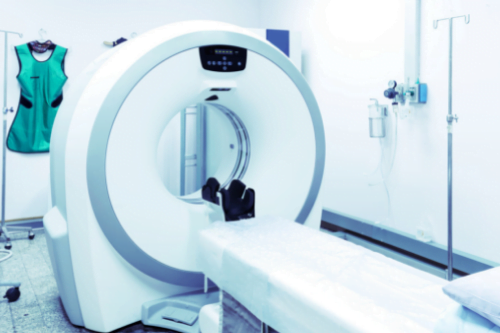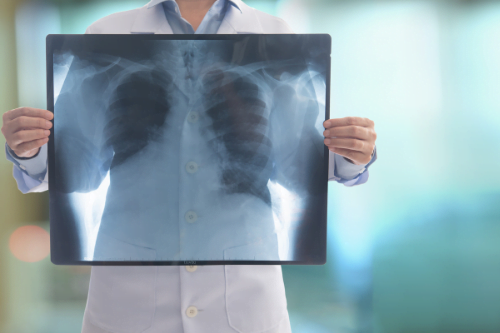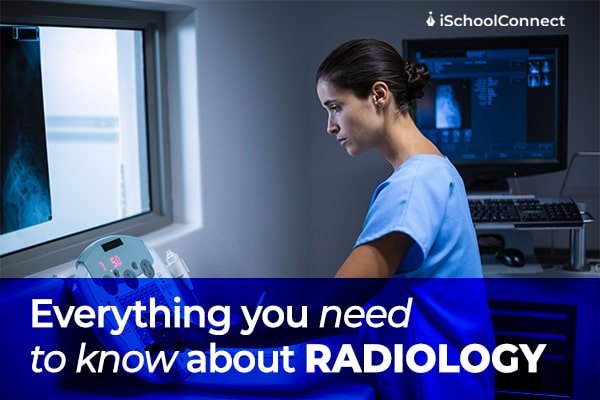Table of Contents
- Radiology course | What is Radiology?
- What is the syllabus of a regular Radiology course?
- What are the skills I will learn in a Radiology course?
- What are the different specializations covered within a radiology course?
- What are the common procedures covered in a radiology course?
- Which universities offer radiology courses abroad?
- Key takeaways
- FAQs
Radiology course | What is Radiology?
The global medical imaging market value was estimated at USD 20.1 billion in 2021. Diagnostic imaging, or radiology, is a series of tests conducted to take images of different body parts. Several of these tests are used for diagnostic purposes by Radiologists.
Radiologists are professionals who conduct PET scans, CT scans, MRIs, and X-Rays to recreate images of various body parts and activities for diagnosis and treatment. Their primary responsibilities include helping physicians pinpoint the root cause of medical issues in patients across all age groups.
If you want to build a career in radiology, consider pursuing a radiology course to learn the ins and outs of the field. Keep reading to discover all the relevant details you need to know about radiology courses!
What is the syllabus of a regular Radiology course?
Radiology courses are offered as 2 or 3-year undergraduate and postgraduate courses. There are several diploma courses also available and provided by medical institutions across the world.
Some of the different subjects covered in the course curriculum include-
- Microbiology
- Magnetic Resonance & Imaging
- Computed Tomography
- Biostatistics
- Biochemistry
- Radio-diagnosis
- Radiation Physics
- Physiology
- Nuclear Medicine Imaging
- Ultrasound Imaging
- PET Scans
- Conventional Radiology Equipment
- MRIs
- CT Scans
- Generating X-Rays
- Properties of X-Rays
- Anesthesia in Diagnostics
- Fundamentals of Computer & Data Science
- Advanced Technology & Instrumentation
What are the skills I will learn in a Radiology course?

A typical radiology course will equip you with a wide range of skills needed to perform the following functions-
- Supervise imaging techniques.
- Offer medical advice to physicians.
- Provide recommendations for treatment.
- Advocate further testing based on results (if required).
- Review and interpret medical images.
- Evaluate the medical history of a patient.
- Determine the type of imaging needed to be based on a patient’s health.
To complete the above responsibilities and more, you will have developed the following skills with your training in radiology-
1. Excellent dexterity
Dexterity is a crucial part of radiologists’ functions. Some specific imaging processes may require the injection of medicinal material into the human body. Therefore, as a professional, you will need to use your hands skilfully when operating the different imaging machines.
2. Analytical thinking
As a Radiologist, you need to have excellent analytical skills to determine and evaluate the effectiveness of a treatment plan. A radiology course will equip you with the skills to reach logical conclusions based on the images generated.
3. Attention to detail
As a radiology professional, you need to pay excellent attention to detail. Reading a patient’s chart, taking notes from a scan, and identifying potential ailments are vital in making accurate diagnoses.
4. Effective communication skills
Radiology courses help you develop the communication skills needed to interact with patients, peers, doctors, and other professionals. This will help you relay complex information in a manner that is understandable.
5. Comprehensive knowledge of human anatomy
A Radiology course has a significant part of the syllabus dedicated to thoroughly understanding human anatomy. This knowledge is crucial to help you identify abnormalities and causes of existing ailments. Without this knowledge, you will not be able to perform the required imaging and scanning procedures.
What are the different specializations covered within a radiology course?
There are several specializations to consider when pursuing a radiology course. These are covered in the course curriculum, helping you explore different aspects of the field.
The specializations covered in radiology courses include-
1. Interventional Radiology
Interventional Radiology uses several kinds of imaging procedures to provide therapy to patients with non-cancerous conditions.
2. Radiation Oncology
Radiation Oncology uses radiation therapies to treat different kinds of cancer. In this procedure, high-energy radiation is used to damage cancer cells and prevent them from metastasizing.
3. Diagnostic Radiology
Different kinds of imaging procedures are used to diagnose and treat illnesses. There are several subspecialties within diagnostic radiology, including chest radiology, musculoskeletal radiology, cardiovascular radiology, and pediatric radiology.
What are the common procedures covered in a radiology course?

Clinical Radiology is at the forefront of minimally-invasive diagnostic procedures. These procedures reduce the rate of infection and allow shorter recovery periods.
Some of the different procedures covered in a radiology course include-
- Treatment of Arteriovenous Malformations
- Treatment of Internal Bleeding
- Needle Biopsies
- Biliary Stenting & Drainage
- Angiography & Angioplasty
- Oesophageal Stents
Which universities offer radiology courses abroad?
Several reputed universities abroad offer excellent radiology courses for you to consider. Some of the best colleges offering radiology include-
| University name | Course offered |
| University of Sydney, Australia | Master of Diagnostic Radiography |
| Monash University, Australia | Bachelor of Radiography & Medical Imaging (Hons) |
| Cardiff University, United Kingdom | MSc Radiography |
| Sheffield Hallam University, United Kingdom | BSc (Hons) Radiotherapy & Oncology |
| University College Cork, Ireland | Master of Science in Diagnostic Radiography |
| St. Francis College, United States | BSc Biology (Radiologic Sciences) |
| Mount Aloysius College, United States | BSc Medical Imaging & Radiography |
Key takeaways
- Radiology is a niche in the healthcare industry that conducts a series of tests to help diagnose and treat medical conditions.
- Pursuing one of the many radiology courses offered by universities abroad can help you develop the relevant skills needed for a career in this field.
- Radiology courses are aimed to train students in several areas of the field, allowing them to develop a niche skillset in their area of interest.
- Pursuing a radiology course can also equip you with the knowledge needed to administer non-invasive treatments.
We hope you found this blog informative. If you need help with choosing the right course or university, feel free to reach out to us or drop a comment below.
Liked this blog? Read next: Biotechnology Engineering Courses | Everything you need to know!
FAQs
Q1. What are some job profiles I can consider with a radiology qualification?
Answer – The different job profiles you can consider with a radiology qualification include-
- Scientific Assistant
- Radiation Protection Specialist
- Therapy Radiographer
- X-Ray technician
Q2. Are there MD courses available in radiology?
Answer – Yes, MD courses in radiology are offered by specific universities abroad.
Q3. Do I need to have a basic background in science to pursue a radiology course?
Answer – Yes, a science background is crucial to pursue a radiology degree.






